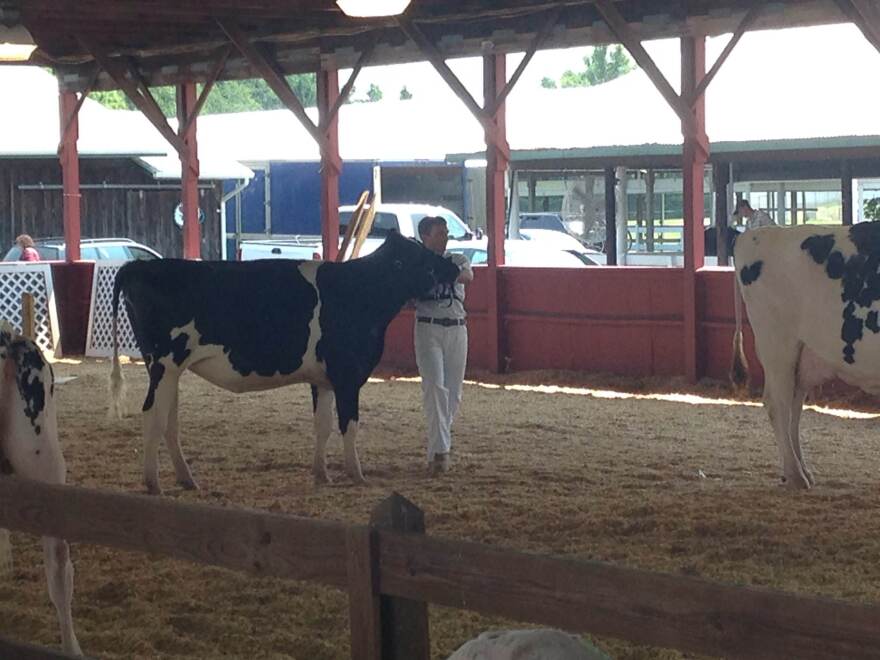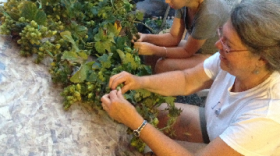With both the Dutchess County Fair and the New York State Fair preparing to open their doors, many young people are gearing up for the rides, games, and food. But some have much more to do. The young members of the organization 4-H are busy preparing their animals and projects for presentation across the country. For people involved in 4-H activities, the organization is an important part of the community.
Dressed all in white, 15-year-old Ethan Martell steps slowly into the arena with his cow Minney in tow. He doesn’t seem too nervous. After all, Ethan’s practically a professional. He’s been involved in 4-H since he was seven and this isn’t his first time in the show ring.
“My sister and I have been doing it, we’ve been showing and presenting since I was in second grade so eight or nine years ago,” says Ethan.
The years of experience show as Ethan calmly leads Minney around the ring in the Junior Holstein Show at the Dutchess County Fairgrounds on a recent Friday. Some of the other contestants struggle to lead their cows, but Ethan, a Millbrook high-schooler, takes his time, giving himself as much space as he needs to show Minney off to the judge.
“There’s two different types of shows. There’s the showmanship class and then there’s like the regular classes. In the showmanship it’s basically how I, the exhibitor, present the animal. The regular type of show is based on the animal itself, the characteristics of it if it’s tall, long, and if it’s a good cow.”
Ethan’s participating in the showmanship class. And with the judge closely watching Ethan’s behavior as well as the cow’s, it’s important that Ethan keep a controlled exterior while guiding Minney.
Ethan says he feels emotionally attached to his two cows, Minney and Caroline.
“Yeah, I would say so. Especially when you’re at the wash rack and you’re washing your cow. You make sure you take extra good care and make sure there is no spot of mud. You make sure she’s extra clean maybe over the other cows.”
Ethan’s patience and affection for his cow show, winning him second place and praise from the judge.
“He knows what he’s doing on that halter. He does a real nice job. And his tail is certainly cleaner,” says the judge.
“You know, getting into the show ring, you get a feeling you that you always want,” Ethan explains.
But Ethan says he has received much more from 4-H than showmanship ribbons.
“Definitely, like leadership roles, the views of agriculture and you just be a part of a team.”

4-H works to empower young people to reach their full potential through hands-on learning. The organization dates back to the late 1890s. Today, 4-H has more than 100,000 members in New York, with more than 7,000 in the Hudson Valley. And what are the four H’s? Head, heart, hands, and health.
Maureen Roche is the Dutchess County 4-H Program Leader at the Dutchess County Cornell Extension Center.
“4-H really is experiential ed," Roche says. "And what we do is work in agriculture, we work in robotics, we work in the STEM sciences. So here in Dutchess County we have 35 clubs, 11 different species and general interest. We have a teen ambassadors program and they do a tremendous amount of community service. We also have a Green Teen Community Gardening program, which is a youth vocational program based in Beacon."
Green Teen is a yearlong youth vocational program that is unique to Dutchess County. Green Teen gives young people living in urban areas the opportunity to gain some experience in an agriculturally centered business.
“We partner with Common Ground Farm on a mobile market that runs every Wednesday for six weeks in the summertime. So the kids are not only learning about urban agriculture, they’re doing marketing, they’re learning about food systems.”
Many are surprised to hear that 4-H does not simply work in agriculture. In fact, vocational programs and career exploration are main focuses of the program in Dutchess County.
“It really is teaching kids about life and giving them the skills that they need to be productive and successful in whatever career they may choose to pursue,” says Roche.
Career exploration happens each summer in Ithaca. 4-H also provides “Capital Days,” where two to four young people from each county travel to Albany to learn about state government.
“While we are an agriculturally based program, we do so much more than that.”
On top of obtaining important life skills and career development, the members of 4-H have a reputation for being highly involved in their communities. A recent study by Tufts University found that kids in grades 7 through 12 and involved in 4-H were four times more likely to make contributions to their community than their peers, and they are two times more likely to participate in science, engineering and computer technology programs outside of school in grades 10 through 12. Roche found that her 4-H community in Dutchess County reflected this study in terms of civic engagement. The Horse Advisory has put on multiple fundraisers for St. Jude’s Research Hospital, and the Hog Advisory has a toys for tots drive during the holiday season.
“And it’s not always the adults who are saying we need to get involved, oftentimes it is the children,” says Roche.
Right now, 4-H members are busy preparing and presenting their animals at their county fairs. The General Manager of the Dutchess County Agricultural Society, Andy Imperati, described the community value 4-H provides the Dutchess County Fair.
“Children that are part of 4-H in their youth, once they age out of 4-H at the age of 19, they come back as open visitors. And it becomes part of the fabric of their life. Their children get involved in 4-H and that’s how we keep the whole system going,” Imperati explains.
One family that has incorporated 4-H as part of the “fabric of their life” are the Veeder-Shaves, who have a farm in Hyde Park. Thirteen-year-old Cosette and 11-year-old Macey have been a part of 4-H since they were five. They currently have 17 sheep, nine born this year, some chickens, three rescue cats, three dogs, some rescue bunnies, and two parakeets. On a tour of their farm, the girls say livestock raising can be a matter of life and death.
“This year we spend a lot of time in there because we have two bottle babies,” Cosette says.
A bottle baby means the lamb was rejected by its mother after birth and it was solely up to the girls to keep the baby alive.
“Bottle babies, I had one last year as well, they get fed in the beginning, like, every three hours. You’re out there constantly,” says Cosette.
“They’re very friendly, even when they’re a year old they’re still looking for that bottle,” Macey says.

But the Veeder-Shave girls don’t just raise sheep. They work with sheep wool to produce clothing. Macey has been learning to spin the wool on a spinning wheel.
“You have to have the wool next you, that’s the big thing. And you pump the wheel,” Macey explains.
Both Cosette and Macey sew for New York State’s “Make It With Wool Contest” at the Sheep and Wool Festival each year at the Dutchess County Fairgrounds. Their mom, Meegan Veeder-Shave, explained that sewing and working with wool is a family practice. She’s been working in sewing since she was in 4-H at the age of nine.
“And she’s still in 4-H! They can’t get rid of her,” Cosette laughs.
“I was, in 1984, the New York State representative to the National 4-H Congress for sewing,” says Veeder-Shave.
4-H provides many opportunities for its members to present their work on the regional, state, and even national level.
“Sheep people seem to be very welcoming. A lot of them have this interesting sheep that you learn a lot about while you’re in the farms. I went to a Finnsheep farm and they can have, like, up to eight babies. We had just had triplets and I thought that was a lot,” Cosette says, laughing.
Cosette and Macey said they are excited see their 4-H friends and to present their sheep at the Dutchess County Fair. It will be the girls’ fifth year presenting their sheep. They say sometimes presenting can be difficult.
“If you had Latte, yes! She kept jumping up! But I did not let go. I am not letting go of that sheep,” Macey says.
Cosette says it’s important it is to adapt to the situation and always be a good sport.
“You’ve always gotta be on your best behavior because you never know. It could be your future employer. Or for the people that sell their meat sheep, the person you meet on the first day could be the person who buys your sheep later in the week. You can’t be the one stomping your feet after you’ve lost in the show ring.”
Cosette and Macey, like most 4-H members, are also active in their communities.
“Cosette had spinal surgery last year up at Albany Med. When we went into the pediatric ICU they had pillow cases for the kids that were different than the white pillow cases. She’s made and donated about 80 of them now,” says Veeder-Shave.

Melanie Forstrom from the Ulster County 4-H department says the organization has evolved. It currently has three mission areas: civic engagement, healthy living, and STEM.
“I think it’s a common misconception that 4-H is not doing a lot with technology. One of our mission mandated areas is STEM. Science, technology, engineering, and math. Every year in October they do a National Science day. The experiment this year is really cool. It basically involves designing your own rocket launch to deliver a food load to an area that’s been involved in a natural disaster. It’s this very complex but cool experiment where you’re using PVC pipes and trying to launch a rocket using just a coke bottle.”
The Ulster County 4-H has established afterschool programming at schools throughout the county.
“Right now we are running a 4-H mentoring program, which basically is life mentoring. We train adults to work with 10-16-year-old at-risk students,” says Forstrom.
The mentoring program includes a monthly event called “Family Night Out” where the kids, their families, and mentors come together.
“This mentor is really another person in this young person’s life that’s gonna advocate for them and be an ally and help them on their path.”
Forstrom says the success of the program depends heavily upon volunteers.
“If we have a hundred volunteers who are well trained and willing to run clubs we can take many more youth than if we have 10 trained volunteers who are willing to run these programs. Right now in Ulster County we have about 50 regular volunteers running our programs, serving about almost 400 club youth.”
Forstrom says that 4-H’s continued success and providing a no-cost program to the county is up to private donors and fundraisers.
“Sometimes because we have the name Cornell people think that we have a lot of money; we really don’t. We struggle to make ends meet here and we really look to private donations and fundraising events such as the Hudson Valley Harvest Fest that we do here in September in Ulster County, together with Family of Woodstock.”
You can check out 4-H this week at the Dutchess County Fairgrounds running from August 19–24 and at the New York State Fair from August 21–September 1. There's more information at www.4-H.org.
WAMC News intern Aubrey Mulvey is a rising senior at SUNY Oswego, studying Broadcasting and Mass Communications.





